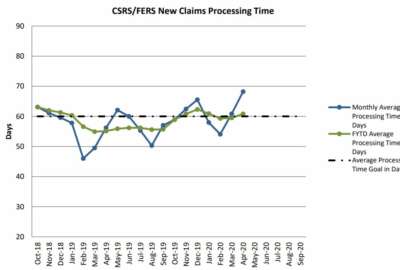
COVID-19 impact on 2021 COLA, pay raise and WEP/GPO
Given the impact of the pandemic on the economy, and on prices, it is unlikely that retirees who get cost of living adjustments most years will be getting a COLA in...
According to some political pundits the 2020 presidential election may be decided by voters who are 60-plus years old. They supported candidate Donald Trump, age 73, last time but, according to some polls, are leaning toward former Vice President Joe Biden, age 77, as of right now.
While many candidates court the younger vote, the numbers show that on election day older Americans out vote their children and grandchildren by a substantial degree. That could be an important factor in places like California, Texas, Florida, Maryland and Virginia where one-third of the nation’s 2.6 million federal retirees and survivors live and vote. Former feds are also an important chunk of the electorate in key states like Arizona (60,826), Florida, (186,027), Michigan (47,422) and Minnesota (31,151).
In Florida, which many consider key to the 2020 win, Trump got 48.6% of the vote last time compared to 47.4% for Hillary Clinton. Independent candidates Gary Johnson got 2.2% with the rest split among other candidates.
The senior vote is often hard to predict but one thing is for sure — it’s there and they vote.
Given the impact of the pandemic on the economy, and on prices, it is unlikely that retirees who get cost of living adjustments most years will be getting a COLA in January 2021. Few private sector companies with pensions match the rate of inflation. People who get Social Security, civil service or military retired pay do get COLA when there is inflation.
Federal workers are not likely to get a raise in January 2021. Good arguments can be made for giving first responders — which in government are a lot of people — more money for the skills they bring and they risks they take. And for giving people called back to work extra pay, too. But an across-the-board pay raise for all federal workers is a long shot considering that tens of millions have been thrown out of work and many of those who remain on the job have taken pay cuts of up to 25% for the privilege of getting a regular paycheck.
Also in this year of a worldwide pandemic is what, if anything, to do to “fix” two long-festering problems that have shaved millions of dollars off the benefits of federal retirees or their survivors. Eliminating or amending the two laws — Government Pension Offset and Windfall Elimination Provision — is the number one political/economic goal of millions of retirees. Here’s a quick explanation of the two from the National Active and Retired Federal Employees which, with other groups, has been seeking repeal or modification for years. A very long shot for obvious reasons:
”The Windfall Elimination Provision (WEP) reduces the Social Security benefits of local, state and federal retirees who worked in Social Security-covered employment (e.g., private-sector jobs) and who also receive a government annuity from their non-Social Security covered government employment. As of December 2019, the WEP affects 1,912,706 beneficiaries, including 1,797,415 retired workers, 12,943 workers with disabilities, and 102,348 spouses and children.
“In 2020, the WEP can result in a monthly benefit that is $480 lower than under the regular benefit formula. This unfair reduction causes a disproportionate reduction in benefits for workers with lower monthly benefit amounts than those with higher benefit amounts. The WEP applies to federal retirees who began their federal employment prior to 1983, and are covered by the Civil Service Retirement System (CSRS). Under CSRS, federal employees pay a 7% payroll contribution toward their CSRS retirement annuities. They do not pay a 6.2% percent payroll tax toward Social Security, and therefore, do not earn any Social Security benefits based on their federal work.
“The WEP does not apply to federal employees covered by the Federal Employees Retirement System (FERS), as these federal employees pay the 6.2% payroll tax, in addition to their FERS retirement contributions, and therefore earn Social Security benefits based on their government work.
“The Government Pension Offset (GPO) legislation was enacted in 1977 to prevent government retirees from collecting both a government annuity based on their own work in non-Social Security covered employment and Social Security benefits based on their spouse’s work record. The new law became effective with government employees who were first eligible to retire in December 1982. The law, known as the Social Security Government Pension Offset, or GPO, provides that two-thirds of the government annuity offsets whatever Social Security benefits would be payable to the retired government worker as a spouse (wife, husband, widow, widower).
“Take the example of a spouse who receives a civil service annuity of $900 per month based on his/her own earnings, and applies for a Social Security widow(er)’s benefit of $500. Two-thirds of his/her annuity, or $600, totally offsets the Social Security widow(er)’s benefit. Therefore, he/she receives no widow(er)’s benefit from Social Security.
“As of December 2019, the GPO affects 707,879 beneficiaries. Of those affected by the GPO, 46% are widows or widowers, and 83% are women. In addition to Civil Service Retirement System (CSRS) annuitants, the GPO affects thousands of state and municipal retirees, as well as teachers and police officers whose work is not covered by Social Security.”
Believe it or not, that is a very simple explanation of a complex problem for millions of retirees. So what’s ahead, if anything?
This morning at 10 a.m. EDT on Your Turn, I’ll be talking with Jessica Klement of the National Active and Retired Federal Employees about the possibility of a pay raise, the outlook (grim) for a retiree COLA and the long, as in very long, shot chances of some kind of reform or change in WEP-GPO. NARFE is part of a coalition working on the issues.
She’ll explain the difference between plans to repeal vs. revise WEP and GPO, and she’ll explain what its like to lobby Congress in a normal year, vs. times like these. The show is live and will be archived on our webpage page so you can listen later, listen again or refer it to a friend. If you have questions for her send them to me before airtime at mcausey@federalnewsnetwork.com.
Listen on www.federalnewsnetwork.com or 1500 AM in the metro Washington, D.C., area.
Nearly Useless Factoid
By Amelia Brust
There is a southern sibling of the northern lights, and they can be seen from southern hemispheric landmasses including Tasmania, New Zealand and Antarctica. The “aurora australis” occurs when electrically-charged solar particles and atoms in the Earth’s atmosphere collide with gases like oxygen and nitrogen, causing those gases to emit light.
Source: Smithsonian Mag
Copyright © 2025 Federal News Network. All rights reserved. This website is not intended for users located within the European Economic Area.
Mike Causey is senior correspondent for Federal News Network and writes his daily Federal Report column on federal employees’ pay, benefits and retirement.
Follow @mcauseyWFED
Related Stories





